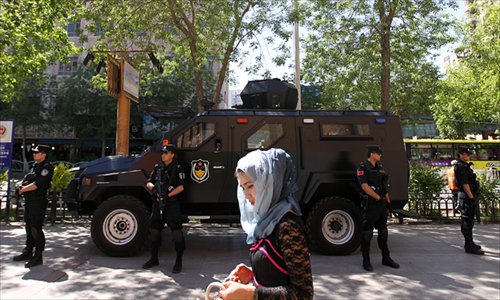Anti-terror plans go national

Police stand guard in a street in Urumqi, Xinjiang Uyghur Autonomous Region on Saturday as a local resident walks by. Security efforts were intensified after a terrorist attack occurred on Thursday at a market in the city, killing 43. Photo: Cui Meng/GT
A one-year anti-terrorism campaign in Northwest China's Xinjiang Uyghur Autonomous Region, which vows "ultra-tough measures and unconventional means," will expand nationwide as terrorist threats become a new norm.
Analysts said the campaign, which is expected to shake off some unnecessary constraints, will deal with the root cause of terrorism in Xinjiang.
The operation in Xinjiang, which was launched Friday and will last until June 2015, came after Thursday's deadly attack at a market in Urumqi, which killed 43, including four assailants, and injured 94.
Soon after its launch, it has seen the apprehension of the first batch of terror suspects.
According to the Xinhua News Agency, police in Xinjiang's Hotan, Kashi and Aksu have busted 23 terrorist and religious extremist groups, caught over 200 suspects and seized more than 200 explosive devices.
Most of them were apprehended in raids early Sunday morning, after local police probed key suspects.
"The raids came as a deterrence for terrorists, and were also a concerted action to pressure some other involved in terror activities to turn themselves in," said Xu Jianying, a research fellow with the Research Center for Chinese Borderland History and Geography at the Chinese Academy of Social Sciences, referring to a statement issued by Xinjiang's legal, procuratorate and public security authorities Saturday.
The statement said those involved in terror-related activities will be given mitigated punishments if they turn themselves in within 30 days, according to Xinhua. It also encourages the public to send tip-offs.
Xu said the tips and surrenders will lead to a follow-up of intelligence for the authorities. "We can expect that the heavy-handed raids will last one or two months, which covers the sensitive period around July 5," he said.
July 5 marks the fifth anniversary of deadly riots in Urumqi, in which 197 people were killed and 1,700 injured.
The campaign has seen strengthened security in the regional capital over the weekend. A Global Times reporter Sunday saw a SWAT team stationed in front of the International Grand Bazaar, a famous market and tourist attraction in Tianshan district. Cars going into the bazaar need to open up their trunks for security checks and passengers need to open their bags.
More police were deployed around schools. A new regulation says no parking is allowed within 100 meters of schools and cars picking up children can only stay temporarily.
Security is also tightened in front of supermarkets, malls and entertainment centers such as karaoke parlors.
Xinjiang said "ultra-tough measures and unconventional means" will be used in the anti-terror campaign. While focusing on terrorists and religious extremist groups, gun and explosive manufacturing dens and terrorist training camps, the regional government also said it will put some key people, who are related to terrorism and religious extremism, under control, and rectify some key villages and towns.
Yang Shu, director of the Institute for Central Asian Studies at Lanzhou University in Gansu Province, told the Global Times that the move is aimed at rooting out religious extremism, the deep-rooted cause of Xinjiang's terror threats. "Those key people may indicate those who have already participated in the spreading of religious extremism or those who are likely to be approached, such as unemployed youngsters."
Li Wei, an anti-terrorism expert at the China Institutes of Contemporary International Relations, shares similar sentiments, adding that some villages, where underground preaching activities are prevalent,will also be targeted.
"However, despite the stressing of ultra-toughness and unconventional means, the campaign will still be carried out in the framework of law," Li said, regarding it is a strengthening of existing measures.
Xu told the Global Times that though the regional government stressed heavy-handed anti-terror measures in the past, it still fell short of strong punishments.
"Sometimes, local authorities only dealt with the attacks in a case by case manner. They stopped short of rooting out the whole terror chain," Xu said, citing the repeated attacks in one single town last year.
Xu also noted that sometimes local authorities strike terrorists in a secretive manner, simply because those suspects were from minority groups.
"These practices made their hands tied in the fight against terrorism. Hopefully, the ongoing campaign could make a difference," he said.
Meanwhile, the website of Hong Kong-based Ta Kung Pao reported that the central authority will hold a key work conference on Xinjiang in June, the second such meeting attended by China's leaders. The first work conference on Xinjiang was held in 2010 in the wake of the July 5 riot in 2009. The meeting will be the first held under President Xi Jinping, who visited Xinjiang late April.
Experts believe the meeting will focus on maintaining stability and building a lasting peace in the region, and the fight against terrorism will be the priority among priorities in the wake of the surge of attacks.
The Ministry of Public Security Sunday announced that police across the country will also start a year-long operation. Police nationwide will pool their information for early identification of terrorist groups and their members.
Newspaper headline: Year-long campaign to be ‘ultra-tough, unconventional’